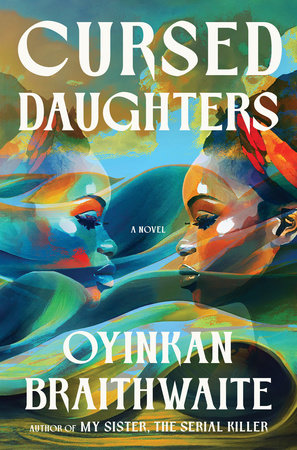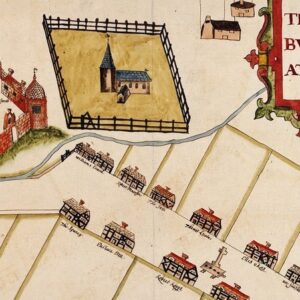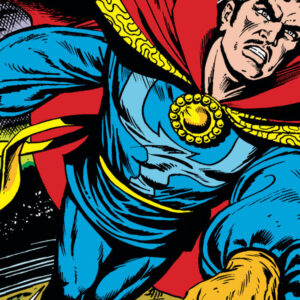Feranmi Falodun (the one who was cursed) was rumoured to be an especially beautiful woman. Her skin was smooth, soaking up the light; her hair was thick, long and heavy.
Her laughter was said to sound like a babbling brook. Her fingers were long and delicate, and she was good with them too, crafting baskets, plaiting hair, knitting clothing. By the time she was ten, her purse was heavy with the kobos she had earned from her talents.
Her father had high hopes that she would fetch a good bride price, so she was the only one of his daughters he bothered to educate. And as he had predicted, she attracted many suitors. But the man who caught her eye in the end was practically a stranger. He had come to her village to bury his father. She spotted him as he walked around the village, observed him as he flirted with the mothers and grandmothers, and scrutinised him as he played host to the crowd there to witness him lay his father to rest. He was new and interesting—a learned man who lived in the city and wore English suits. But he paid her no mind. At first.
She didn’t like being ignored, and so she crept into his father’s bungalow one night, past the room where his mother loudly snored and into his arms; a seductive spirit who (as he would tell his wife years later) overwhelmed him, body, mind and soul. The night they spent together was a fever dream. When he stumbled into the light in the morning, he wasn’t entirely sure that anything had taken place. The spirit had already gone. He didn’t even know its name.
He had planned to leave that day; his father rested six feet under and his things were packed. His driver brought the car to the front of the bungalow, and he readied himself for the long journey home. There was a large group of people, led by the chief, marching his way, and he was briefly curious where they were going. They stopped just short of him, so he greeted them warmly, remembering to prostrate for the chief. But the chief ’s response was much cooler than he was accustomed to.
“So you were planning to eat plantain and leave without paying?” the chief said in his proud English. The man chose to respond in Yoruba.
“Nígbà wo ni mo jẹ dòdò, tí mi ò ṣ’ọ´wọ´?”
The crowd split in half, revealing the seductive spirit that he had spent the better part of the night trying to tame.
Feranmi. Her name was Feranmi, and she was the answer to the question he had asked. The saliva turned solid in his throat. It would not be so easy to leave town.
They came to an agreement. The man from the city provided goats, yam, fish, palm oil, orogbo, sugar and honey. He also provided cash. It was the bride price that Feranmi’s father had always envisioned. Then, under an auspicious sky the following week, the man sat resplendent in his expensive agbada, and they brought the girl he had acquired to kneel for him in her matching colours. He purchased a modest but well-built home to situate her in. He consummated the marriage, which was the easiest part of the whole affair; and then he was free to leave.
He barely thought of Feranmi between his brief, infrequent visits. His life was not particularly changed by her introduction to it. It was five years before his first wife insisted on accompanying him to see the house he had built in the village—a home she assumed would be her children’s inheritance. On the long journey, the man’s driver observed his employer sweating profusely, and asked if they should turn back. But his oga could barely speak. When they arrived at the village, the driver was discreetly sent ahead to ask Feranmi to pretend she was in his oga’s employment; but Feranmi had no interest in playing housemaid, or in hiding Wemimo, her precocious daughter. She met her husband’s wife with her head held high, her eyes bright and unblinking.
The husband they shared suddenly remembered that he needed to greet the chief. He left the two women to sort themselves out. Forty-five minutes later, in response to their high-pitched screams, a crowd gathered. They were found locked in combat, with torn clothing and blood trickling from various deep scratches. It took five minutes to pull them apart, and the growing audience watched as the first wife rose to her full height, pointed a trembling finger at the second wife and declared:
“It will not be well with you. No man will call your house home. And if they try, they will not have peace. Your daughters are cursed—they will pursue men, but the men will be like water in their palms. Your granddaughters will love in vain. Your great-granddaughters will labour for acknowledgement, but they will fall short of other women. Your daughters, your daughters’ daughters and all the women to come will suffer for man’s sake. Kò ní dá fún ẹ´.” Then she swiped the blood from one of her many wounds and smeared it on the ground.
Feranmi laughed. She was confident in herself, in her beauty and in the beauty of her daughter. But this time when her husband left the village, he did not return.
Twelve-year-old Ebun told sixteen-year-old Monife that she didn’t believe in curses.
“That’s fine,” said Monife, between the slow chewing of gum, “but what if the curse believes in you?”
__________________________________
From Cursed Daughters by Oyinkan Braithwaite. Reprinted by permission of Doubleday, an imprint of the Knopf Doubleday Publishing Group, a division of Penguin Random House LLC. Copyright © 2025 by Oyinkan Braithwaite.
Audio excerpted with permission of Penguin Random House Audio from CURSED DAUGHTERS by Oyinkan Braithwaite, excerpt read by Diana Yekinni. Oyinkan Braithwaite ℗ 2025 Penguin Random House, LLC. All rights reserved.













